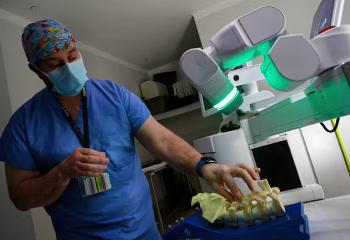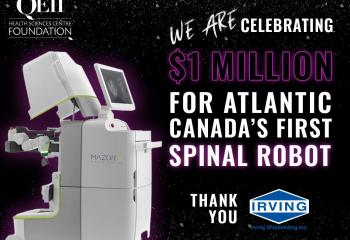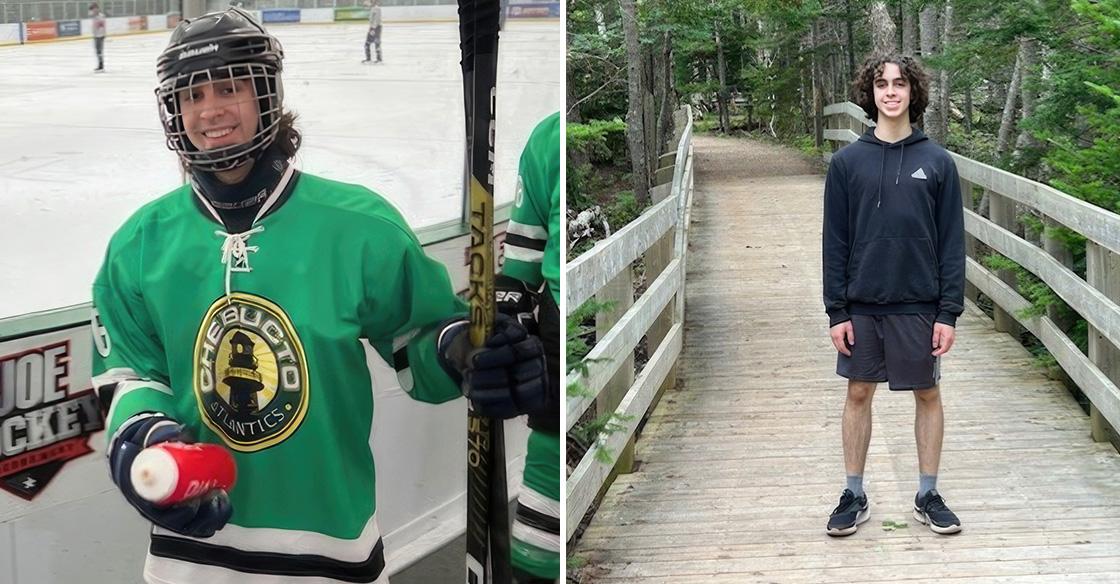
Pictured: 16-year-old Matthew Muise who underwent Canada's first robotic-assisted surgery for pediatric scoliosis.
Canada’s first spinal robot for patient care has reached another major milestone. In an exciting leap forward, the QEII Health Sciences Centre and IWK Health have successfully performed Canada's first robotic-assisted surgery for pediatric scoliosis, marking a historic milestone in surgical robotics and pediatric care.
This groundbreaking procedure was performed by a world-class team — including surgeons, Dr. Ron El-Hawary, Dr. Ben Orlik and Dr. Andrew Glennie —using the MAZOR X spinal robot at the QEII Health Sciences Centre; cutting-edge technology that was fully funded by QEII Foundation donors.
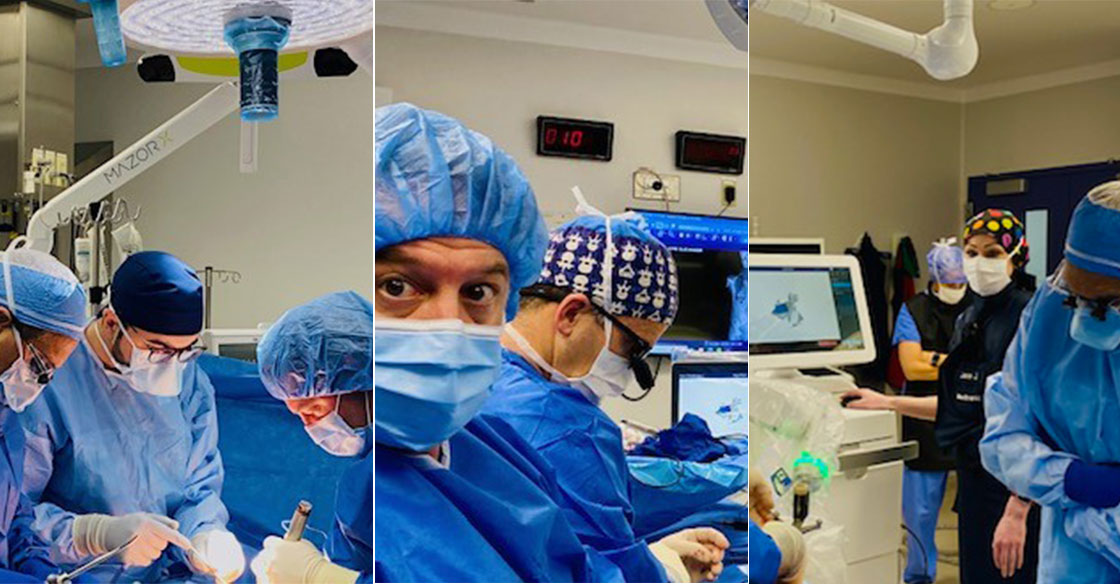 Pictured: Teams complete Canada's first robotic-assisted surgery for pediatric scoliosis at the QEII last month, marking a historic milestone in surgical robotics and pediatric care (Source: Medtronic).
Pictured: Teams complete Canada's first robotic-assisted surgery for pediatric scoliosis at the QEII last month, marking a historic milestone in surgical robotics and pediatric care (Source: Medtronic).
Scoliosis is a medical condition characterized by an abnormal sideways curvature of the spine, often presenting as an "S" or "C" shape. Scoliosis surgery typically involves the placement of a number of screws and rods, mere millimeters from the spinal cord and major blood vessels. In late-April 2024, IWK and QEII healthcare teams performed the intricate spinal surgery, assisted by the MAZOR X spinal robot for the very first time. It unlocks a new era of pediatric spinal surgeries with the ability to navigate the delicate spinal anatomy, place instrumentation and correct spinal deformities with new and unparalleled precision and accuracy.
For youth living with scoliosis, access to robot-assisted surgery can offer relief from physical discomfort which can be debilitating and a return to a fuller, more active childhood. It holds potential for a truly life-changing impact – restoring mobility, confidence, and quality of life for those affected by scoliosis.
“The use of intra-operative navigation and robotics is a huge advancement in the care of pediatric scoliosis patients in Canada. These enabling technologies allowed us to perform this revolutionary surgery safely and effectively,” says Dr. Ron El-Hawary, pediatric spine surgeon at IWK Health. “I am proud of our team in Halifax for being part of this major advancement in innovation.”
For 16-year-old patient, Matthew Muise, learning a robot would be assisting the surgical team during his procedure was pretty neat.
“Before this, I had never heard of robotic surgery,” says Matthew. “It’s cool that they use the robot to help place the screws exactly where they want and can be even more precise.”
Matthew and his parents, Graziella and Colin, attribute his smooth recovery, in part, to this advanced surgical precision combined with the expertise of his “great care team”.
Now several weeks post-procedure, Matthew describes his pain as minimal.
“From a pain management perspective, he’s doing phenomenal and he’s moving extremely well” says Graziella. “During his first post-op visit, his care team noted how impressed they were with his mobility.”
While being the first pediatric patient in Canada to undergo this type of robot-assisted surgery comes with some serious bragging rights, the milestone Matthew looks forward to the most is playing baseball and hockey again.
“He can’t wait to get back to the sports he loves,” says Graziella.
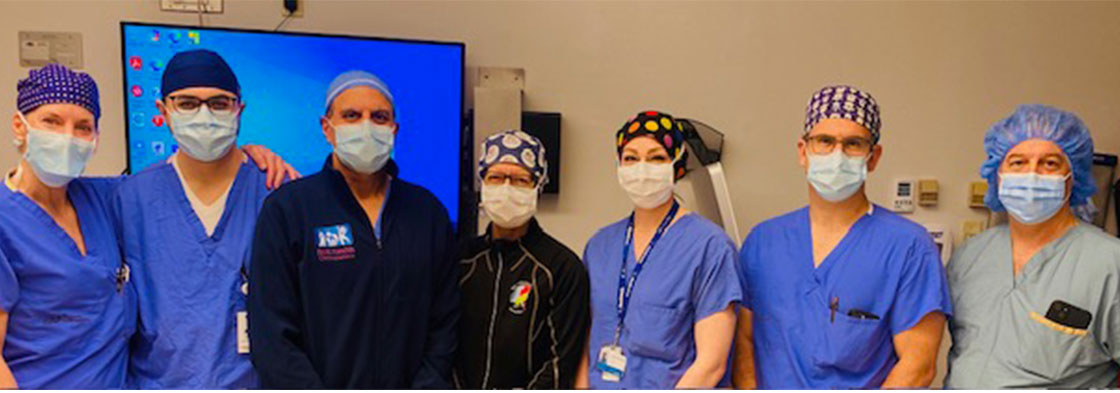 Pictured (L-R): Jen Hoyt, territory manager (Medtronic); Dr. Ahmad Aleumi, pediatric spine fellow (IWK Health); Dr. Ron El-Hawary, orthopedic surgeon (IWK Health); Dr. Susan Morris, neurophysiologist (IWK Health); Janine Johnson, MAZOR robot specialist (Medtronic); Dr. Andrew Glennie, orthopedic surgeon (QEII); and Dr. Ben Orlik, orthopedic surgeon (IWK Health). Source: Medtronic.
Pictured (L-R): Jen Hoyt, territory manager (Medtronic); Dr. Ahmad Aleumi, pediatric spine fellow (IWK Health); Dr. Ron El-Hawary, orthopedic surgeon (IWK Health); Dr. Susan Morris, neurophysiologist (IWK Health); Janine Johnson, MAZOR robot specialist (Medtronic); Dr. Andrew Glennie, orthopedic surgeon (QEII); and Dr. Ben Orlik, orthopedic surgeon (IWK Health). Source: Medtronic.
Paving the way
The QEII Health Sciences Centre is no stranger to making history when it comes to surgical robotics. Thanks, in part to QEII Foundation donors, the Halifax hospital currently has the most surgical robots in use in all of Canada and has been home to several Canadian and Atlantic Canadian firsts using this game-changing technology.
In July 2022, QEII teams performed the nation’s first robot-assisted spinal surgery using the MAZOR X spinal robot. This latest milestone with Canada’s first robotic-assisted surgery for pediatric scoliosis is a testament to the unwavering commitment of our surgical teams to pushing the boundaries of innovation and excellence. By embracing cutting-edge technologies and fostering a culture of collaboration, Nova Scotia is paving the way for a brighter future in adult and pediatric surgical care.
This remarkable achievement would not have been possible without the incredible support of QEII Foundation donors, including Irving Shipbuilding Inc. who made a $1-million gift to help fund the MAZOR X spinal robot and its accompanying research. The $3-million project is part of the QEII Foundation’s $100-million We Are campaign.
“Healthcare teams have proven once again that the QEII is a national leader and centre of excellence in robotics and philanthropy is truly the catalyst,” says Susan Mullin, QEII Foundation president and CEO. "Thanks to the visionary generosity of Irving Shipbuilding Inc. and our dedicated community of donors, we are transforming the landscape of health care and offering new hope to patients and families facing complex spinal conditions."
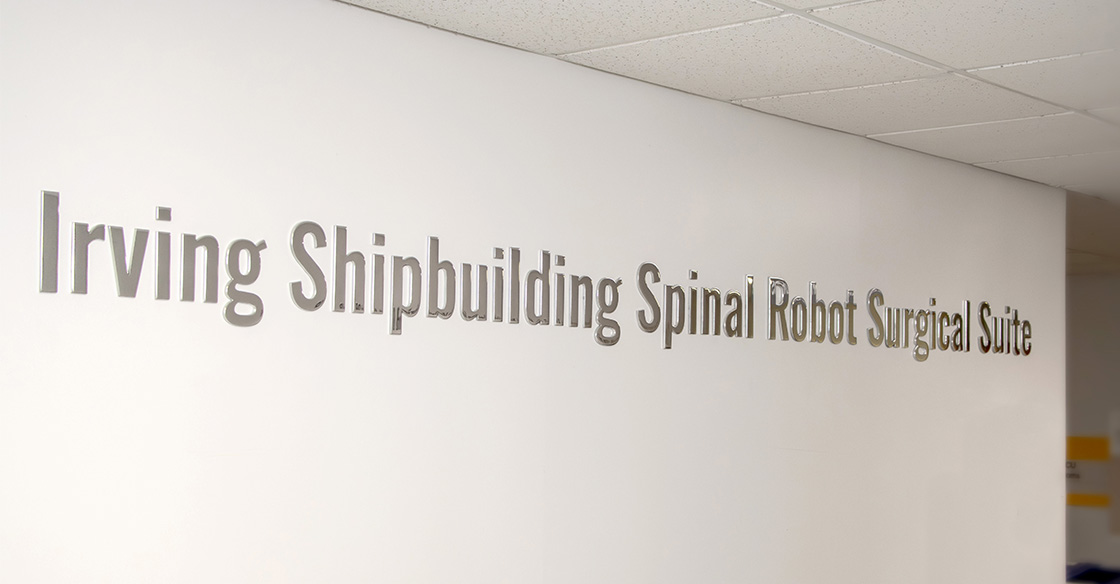
Pictured: Canada's first robotic-assisted surgery for pediatric scoliosis was performed in the Irving Shipbuilding Spinal Robot Surgical Suite at the QEII.
~*~*~*~*~*~*~*~*~*~*~*~*
The QEII Foundation is proud to partner with Nova Scotia Health and Nova Scotia Health Innovation Hub on helping to transform healthcare delivery and ensuring high-impact, donor-funded solutions for our region, like access to surgical robotics. These initiatives are some of many game-changing projects that are revolutionizing care here at home, through the QEII Foundation’s We Are campaign.
